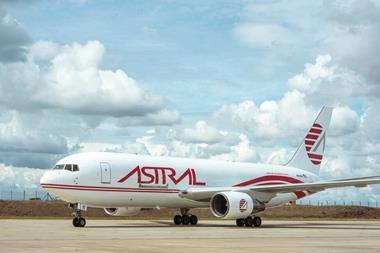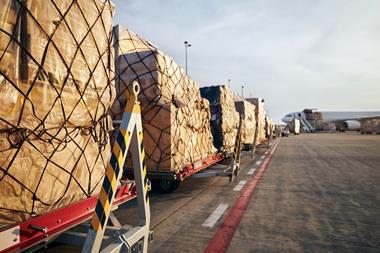Emirates saw its cargo volumes decline in the first half of its financial year as carrying capacity was heavily reduced as a result of the grounding of much of its passenger operations.
The Dubai-hubbed airline reported first half cargo volumes of 785,000 tonnes, which is down 35% compared with 2019 levels and comes on the back of a 67% reduction in capacity in available tonne km terms.
The carrier pointed out that it quickly adjusted its fleet and network to limit declines in cargo volumes.
"Emirates was able to uplift 65% of its cargo volumes compared to the same period last year, which shows its cargo division’s outstanding agility in adapting its operations to provide air freight services in this new environment," it said
"In a very short time, Emirates SkyCargo completed the partial retrofit of 10 Boeing 777-300ER passenger aircraft to transport freight on the main deck, introduced new operation protocols to enable the safe uplift of cargo in passenger cabins, rapidly restarted and scaled up its global cargo network, and put in place comprehensive bio-safety protocols for employees."
More recently, it has begun using its A380 aircraft on cargo-only flights.
Overall revenue at the airline was down 75% year on year to AED11.7bn ($3.2bn), and loss of AED12.6bn ($3.4bn) after a half-year profit of AED862m ($235m) for the same period last year.
"Revenue was mainly supported by strong cargo business," the company said.
The Emirates Group ground handling business, dnata, saw its cargo volumes decline 12% to 1.3m tonnes.
"Robust airfreight traffic across markets was a bright spot for dnata’s airport operations which responded nimbly to meet customer demand," it said.
The overall group saw revenues for the first half decline by 74% to $3.7bn and it reported a loss of $3.8bn against a profit of $300,000 last year.
Ahmed bin Saeed Al Maktoum, chairman and chief executive, Emirates Airline and Group said: “We began our current financial year amid a global lockdown when air passenger traffic was at a literal standstill. In this unprecedented situation for the aviation and travel industry, the Emirates Group recorded a half-year loss for the first time in over 30 years.
“As passenger traffic disappeared, Emirates and dnata have been able to rapidly pivot to serve cargo demand and other pockets of opportunity. This has helped us recover our revenues from zero to 26% of our position same time last year."
He added: “We have been able to tap on our own strong cash reserves, and through our shareholder and the broader financial community, we continue to ensure we have access to sufficient funding to sustain the business and see us through this challenging period. In the first half of 2020-21, our shareholder injected $2bn into Emirates by way of an equity investment and they will support us on our recovery path.”
The Emirates Group’s employee base, compared to 31 March 2020, is reduced by 24% to an overall count of 81,334 as at September 30, 2020.
"This is in line with the company’s expected capacity and business activities in the foreseeable future and general industry outlook," it said.
In terms of fleet, it has retired three older aircraft compared with last year and now operated with 267 aircraft.















